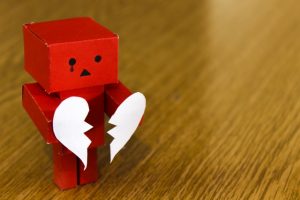What Is Codependency?
“Codependence” (or “codependency”) was a buzzword in the 1980’s that has persisted even today – and for good reason. Many people struggle with being addicted to relationships or feeling stuck in relationships they know may be unhealthy but unable to get out. These are indications that the relationship may be codependent.
In a healthy relationship, each individual is autonomous and has his or her own set of thoughts, feelings, desires, and dislikes. They come together in common interests and values, yet still retain their differences and even learn over time to enjoy these differences in one another. Each partner is able to have his or her own interests while allowing the other partner the same freedom and individuality.
 In codependent relationships, however, the two individuals mesh into one. Partners may lose their sense of self because of this enmeshment, sacrificing their individuality for the other person or for the relationship. In many codependent relationships, each person takes responsibility for the other so that they are no longer responsible for their own selves. This is how codependency produces the feeling of being stuck or powerless in a dysfunctional relationship.
In codependent relationships, however, the two individuals mesh into one. Partners may lose their sense of self because of this enmeshment, sacrificing their individuality for the other person or for the relationship. In many codependent relationships, each person takes responsibility for the other so that they are no longer responsible for their own selves. This is how codependency produces the feeling of being stuck or powerless in a dysfunctional relationship.
Furthermore, when codependent people are in unhealthy relationships they fear how their partner will respond or how their actions will affect their partner so they become constrained and controlled by their partner’s reactions. On the other hand, codependent people may be the controlling ones who try to get their partner to do this or that in order to avoid something bad or to become something better. Either way, powerlessness has crept in which makes people feel like they cannot make changes in the relationship without their partner reacting negatively – so they don’t do it.
If any of this sounds familiar to you, read on – you might be codependent, be in a codependent relationship, or come from a family with codependency. The good news, however, is that things can change and you can untangle your relationships to become healthier! It will require some hard truth and hard work on your part, but the freedom and security you will find outside of codependency will be worth it.
Common Symptoms
Codependency can take many forms, but there are common symptoms that are pretty well-known. Here are some of them:
- Unable to see yourself, your life, or your relationships clearly or objectively
- Having a warped sense of responsibility
- Being easily controlled by others
- Finding yourself controlling others
- Boundary problems – too few or too flexible boundaries, or too many or too rigid boundaries
- Distorted ideas about love and intimacy
- Feeling guilty or selfish when you do something for yourself
- Difficulty making decisions or self-doubt
- Frequent excessive worry about what others are thinking or feeling
Underlying Causes
There are many causes for codependency but the classic example from the 1980’s is stems from parents who are alcoholics. Alcoholic parents do not take care of themselves responsibly and therefore their children are forced to act like adults and pick up responsibilities that should not be theirs. In the process they learn to deny or suppress their own selves in order to take care of their parents, siblings, finances, and household duties.
 In other cases, codependency can arise when a family member suffers from mental health issues such as trauma or bipolar disorder. The family member’s illness often becomes the central focus in the family that everyone dances around or takes care of, resulting in neglect or denial of everyone else’s feelings and needs.
In other cases, codependency can arise when a family member suffers from mental health issues such as trauma or bipolar disorder. The family member’s illness often becomes the central focus in the family that everyone dances around or takes care of, resulting in neglect or denial of everyone else’s feelings and needs.
Abuse and neglect are also common causes of codependency. Situations where domestic abuse (control and manipulation) is present, where substances are being abused, where children are abused or neglected, and even where there is one or more parent absent can all produce codependency. In these cases, one or more individual’s thoughts, feelings, and needs are not met, they are met but with strings attached, or they are met inconsistently.
Treatment & Recovery
Thankfully, it is absolutely possible to get treatment for and recover from codependency. Effective treatment requires the help of other people to support the codependent person’s growth of self – including an awareness of who they are and their patterns of behavior. This means supportive friends, family members, and therapists must be secure with themselves and committed to the well-being of the codependent person. Why? To become aware of codependency, you must first learn to see yourself, your life, your relationships, and the world as it truly is, rather than the way you want it to be.
 Hard truth and honesty is a hallmark of effective treatment because codependent people have spent their lives worrying about or caring for others but neglecting themselves, not realizing who they have become in the process. It is often painful to realize but it frees you from the distortions you’ve lived with and the entanglements that make life so chaotic.
Hard truth and honesty is a hallmark of effective treatment because codependent people have spent their lives worrying about or caring for others but neglecting themselves, not realizing who they have become in the process. It is often painful to realize but it frees you from the distortions you’ve lived with and the entanglements that make life so chaotic.
Recovery is a long process as well. Discovering these hard truths and then learning how to see, think, feel, set boundaries, be honest, and be vulnerable are all necessary skills for a recovering codependent and which take time to develop. Furthermore, they take a lot of practice and a lot of mistakes to learn from. These should only be done with safe people and in environments that are conducive to growth because as you begin to change, others will have to adjust to those changes as well – whether they like it or not. Often this is difficult for people to accept, but with loving and supportive relationships these people will come to see how much healthier and functional the new, NON-codependent relationship with you can be. Intimacy is richer and connections are stronger. Freedom abounds and joy is finally able to exist!
We recommend the help of a professional in this journey through codependency – someone who is familiar with it and can guide you through all of its ups and downs. A therapist is a great resource for codependence recovery because we will be honest with you while walking with you every step of the way. We are committed to your well-being and want you to be the healthiest you that you can be!
Resources
Books
- “Codependent No More” by Melodie Beattie
- “Beyond Codependency” by Melodie Beattie
- “The New Codependency” by Melodie Beattie
- “Facing Codependency” by Pia Mellody
- “Boundaries” by Henry Cloud & John Townsend
- “Conquering Codependency” by Pat Springle
- “You’re Not Crazy – You’re Codependent” by Jeanette Elisabeth Menter
Websites
Contact one of the therapists at Discover Counseling today
if you struggle with codependency and are interested in getting help.
